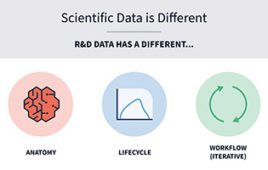Seven Tips for Staying on the Right Side of the Ethical Line in Tough Times and Beyond
Avoiding the consequences of cutting corners
Times are tough in business right now, certainly including laboratory informatics, and any sane business person is trying to cut corners in any way possible. Scaling back on your attention to ethics, however, can have catastrophic consequences. Between the possible fines, legal fees and reputational damage to you and your company, you could lose anything from thousands to millions of dollars as well as your career or business. No matter how tough the times are, that kind of risk is simply not worth taking. Unfortunately, though, tough times can easily make it seem worth trying to cut ethical corners if it looks like there might be some financial gain from it. However, the legal, financial and public relations risks far outweigh any benefit you might imagine could be in store.
Whether an informatics vendor or a customer, here are some thoughts on things to do — and not do — to help keep your focus on doing the right thing through both the good times and the bad:
1. Know your company’s values and let those values dictate each and every business decision you make. Don’t have a values statement? Don’t worry — you’re in good company, as very few businesses do. Write one and write it carefully. You want it to include a short list of the most persistent, most important priorities that should drive your behavior and the behavior of every member of your department or company. Your values statement needs to be so clear that any employee, at any moment and in any situation, can decide whether their intended actions are or are not aligned with these essential values. (Writing a great values statement is far more difficult than it sounds. However, taking the time to get it right is one of the best tools you can have for assuring that you and your entire company are doing what you are supposed to be doing, regardless of any pressure to do otherwise.)
2. Know the law. That may sound obvious, but it’s amazing how many people cannot list many of the laws and regulations that apply to their work. Without knowing the relevant business laws, government regulations and informatics standards, as well as how to ethically apply them, you’re not even in the game. Some regulations, like 21 CRF Part 11 regarding data security, are widely accepted as a standard best practice while others, like the HIPAA privacy regulations for example, are applied more restrictively. Do you know which ones apply to you and your organization? Do you have policies and procedures in place to assure that the mandates of those laws, standards and regulations are met — or, ideally, surpassed — each and every day? If not, remember that there are potentially legal, as well as ethical, ramifications at play here.
3. Remember that you’re not the only one going through tough financial times right now. Why does that matter? It’s not just because it might help you feel a little less alone — it’s because there are probably more potential clients than ever out there right now who would be happy for you to cut ethical or legal corners to help their bottom line. Sweetheart deals are on the rise in many places, and conflict of interest actions appear to be at an all time high. Just because another business owner or vendor representative tells you that something wrong is really okay, that doesn’t make it so. If you are approached about a contract that even feels shady — let alone one that you know to be shady — run, don’t walk, away from it as fast as you can. If that comes from a vendor representative, do the world a favor and notify that rep’s boss. The boss may well not know what is going on and needs to know. Plus, if they know and don’t care, that will certainly help you know not to do business with that company in the future.
4. Pay attention to your thinking and, in particular, to your rationalizations. If you hear a voice in your head — or words from someone else — trying to make excuses for an action that doesn’t seem right, pay attention; this is one of the easiest “red flags” for ethics problems to scan for. If you need to try to justify your actions — especially if it’s before you’ve even done whatever it is — what are the chances that it’s really something right? The chances are low. Of course, trying to rationalize something doesn’t necessarily mean that the behavior is wrong; it’s just the sign of a risk. Once you become aware of a potential legal or ethical problem, though, you can’t ignore it. Doing so simply leaves the door open to stepping over the ethical or legal line, however much you may say it’s not your intention.
5. Pay attention to your gut. If you feel like something may not be right, it probably isn’t. Mind you, our guts can steer us wrong, but it’s usually the other way around. In other words, we can often convince ourselves that something wrong is really okay; that’s why we need to pay such close attention to rationalizations. However, we rarely tell ourselves that something okay is actually wrong. If it feels like you’re heading down the wrong path, again, pay close attention. If your gut is correct, it’s never too soon to keep yourself from stepping over the line nor is it ever too late to stop something inappropriate that you’ve been doing.
As just a couple of examples out of many possible ones:
• When selling systems are your marketing materials absolutely accurate or are there exaggerations or omissions either of which could be seen as misrepresentation?
• When putting together a requirements list, is a given requirement there because the lab needs it or because you owe a favor to someone?
The moment you become aware of any such issue is the moment you need to step back and ask yourself to go in a different direction.
6. Not sure whether or not something is ethical or legal? Seek out knowledgeable peers and ask them. There’s never a problem with being unsure, whether or not something is ethical or legal. However, there is a huge program with being unsure and then doing nothing to find out.
7. Everyone is in this together, and the reputation of the informatics industry depends on every member of the industry. If you see another professional doing something wrong, you can’t simply turn a blind eye. To do so simply isn’t holding up your end of the bargain. Be blunt with the other individual about your concerns — tactful, hopefully, but honest. Let them know the nature of your concern and give them a chance to explain. After all, you may have misunderstood what they are doing or, in fact, may actually be the one doing things incorrectly. You will never know, though, unless you have that direct conversation. Will it feel tough to confront them? Maybe. But think of it this way — if someone else had concerns about you, would you rather they alerted you to it or simply ran down your reputation to others?
Ethics are funny. Everyone in business agrees that they (ethics) are critically important, but that it’s always someone else who needs to pay closer attention to them. Most informatics professionals believe that they somehow could not possibly have a problem, and that it’s always some other person or some other company doing things wrong. Obviously, though, it can’t always be someone else…
The reality, whether we like to acknowledge it or not, is that every one of us has the potential to cross an ethical boundary; it’s just a matter of whether or not we happen to land in the perfect storm in which we have a need or wish (usually financial or interpersonal) and the opportunity to try to meet that need by doing something despite it being wrong. Especially in the current economy, many more of us are feeling financial and other pressures, and that can be fertile ground for stepping over some ethical line. None of that means that we are bad people — simply that we are human. In other words, the measure of success isn’t whether or not we are tempted to cut ethical corners, but, rather, whether or not we can continue to walk the required ethical line even when a down business climate is calling us to do otherwise.
Fortunately, sooner or later, the business climate will again improve. Like it or not, though, the risks we all carry for potential ethical problems will still be with us once that happens. Business climates may come and go, but our need to stay vigilant in monitoring our ethics must be constant regardless of the business climate; again, it all comes back to our being human and subject to compromising our values when there is an incentive to do so. Hopefully, these seven tips will make it easier to stay on the right side of the ethical line no matter what shape the economy takes.
*Author’s note: The author would like to thank John Joyce for his considerable input into the technical portions of this article.
Christopher Bauer, of Bauer Ethics Seminars, is based in Nashville, TN. He is the author of the free Weekly Ethics Thought newsletter. He may be reached at [email protected].




